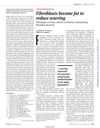TLDR The study found that a specific signaling pathway helps skin wounds heal faster but may lead to larger scars.
The document describes a study investigating the impact of β-catenin-dependent Wnt signaling on acute cutaneous wound healing and scar formation. The researchers observed an increase in the expression of Wnt ligands such as Wnt3a, Wnt4, Wnt10a, and Wnt11 in the hair follicle and epidermis after creating wounds on mice. Treatment with recombinant mouse Wnt3a (rmWnt3a) led to faster wound closure, larger scars, and higher expression of fibroblast growth factor receptor-2 and type I collagen. The study demonstrated that Wnt signaling is upregulated following skin injury and that rmWnt3a can enhance reepithelialization, wound matrix maturation, and scar formation. The study used 7 mice for the wound closure analysis and 3 mice for gene expression analyses. Future research will explore the regulation of other Wnt ligands that increase after wounding.
 13 citations
,
February 2017 in “Science”
13 citations
,
February 2017 in “Science” Turning scar-forming cells into fat cells can reduce scarring.
 408 citations
,
January 2017 in “Science”
408 citations
,
January 2017 in “Science” Some wound-healing cells can turn into fat cells around new hair growth in mice.
 132 citations
,
June 2016 in “Cell and Tissue Research”
132 citations
,
June 2016 in “Cell and Tissue Research” The right cells and signals can potentially lead to scarless wound healing, with a mix of natural and external wound healing controllers possibly being the best way to achieve this.
 41 citations
,
August 2015 in “The FASEB Journal”
41 citations
,
August 2015 in “The FASEB Journal” Blocking the Wnt/β‐catenin pathway can speed up wound healing, reduce scarring, and improve cartilage repair.
 61 citations
,
October 2013 in “PLoS ONE”
61 citations
,
October 2013 in “PLoS ONE” Boosting Wnt signaling improves skin wound healing.
 237 citations
,
June 2013 in “Nature Medicine”
237 citations
,
June 2013 in “Nature Medicine” A protein from certain immune cells is key for new hair growth after skin injury in mice.
 829 citations
,
May 2007 in “Nature”
829 citations
,
May 2007 in “Nature” Hair follicles can regrow in wounded adult mouse skin using a process like embryo development.
159 citations
,
January 2006 in “BMC Cell Biology” Wnt signaling can improve skin healing by promoting epithelial growth.
 66 citations
,
July 2015 in “Organogenesis”
66 citations
,
July 2015 in “Organogenesis” Wnt signaling is crucial for skin wound healing and reducing scars.
Stem cell therapy shows promise for better burn healing but needs more research and standardization.
 3 citations
,
June 2021 in “PLOS ONE”
3 citations
,
June 2021 in “PLOS ONE” A topical BRAF inhibitor, vemurafenib, can speed up wound healing and promote hair growth, especially in diabetic patients.
 471 citations
,
October 2012 in “Cellular and Molecular Life Sciences”
471 citations
,
October 2012 in “Cellular and Molecular Life Sciences” Understanding developmental pathways can improve wound healing treatments.
 132 citations
,
June 2016 in “Cell and Tissue Research”
132 citations
,
June 2016 in “Cell and Tissue Research” The right cells and signals can potentially lead to scarless wound healing, with a mix of natural and external wound healing controllers possibly being the best way to achieve this.











